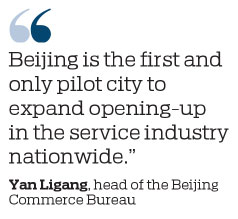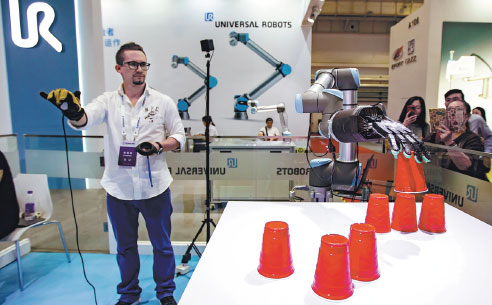Capital's goal to expand reform: boost science and technology
Tourism, education, and healthcare will also benefit from new measures, officials say
Beijing has recently released an action plan to expand reform and opening-up in the city's service industry for more foreign investment and international cooperation, according to the city's commerce bureau.
The capital city will focus on expanding opening-up in major fields including science and technology, finance, education, cultural tourism and healthcare, according to the plan.

"Beijing is the first and only pilot city to expand opening-up in the service industry nationwide," said Yan Ligang, head of the Beijing Commerce Bureau.
It has attracted high-end international resources, which helped create an open environment and lay a solid foundation for the city to carry out a range of reforms, Yan said.
The three-year action plan consists of eight major fields with 190 measures, instructing eight relevant departments to conduct pilot measurement. These departments include the Beijing Science and Technology Commission, the Beijing Bureau of Economy and Information Technology, the Beijing Local Financial Supervision and Administration, the Beijing Education Commission, the Beijing Culture and Tourism Bureau and the Beijing Commission of Development and Reform.
In the next three years, the city will seek breakthroughs in policy reform and industrial innovation, which includes reforming institutional business registrations, optimization of the funding environment for companies and the rolling out of preferential policies.
The action plan also features the launch of major projects and Beijing will promote the construction of international communities and establish a sound environment for the service industry following international standards, Yan said.
In addition, the city will set up a one-stop service center for foreign professionals and establish an online platform for a national scientific research innovation center.
Wang Jianxin, an official of the Beijing Science and Technology Commission, said the commission would engage in introducing overseas technological talents, offering customs conveniences for technology companies, supporting companies in building an automotive test and development center and rolling out regulations to promote the commercialization of science and technology.
"We will cooperate with related departments to mobilize high-end scientific research resources and strengthen international exchanges to contribute more to the construction of an innovation center with a global influence in Beijing," Wang said. From January to June, 755 foreign-invested companies involved in the service sector opened for business in Beijing, and the amount of foreign capital utilized was $8.59 billion.
The added value of the service industry accounted for 82.8 percent of the city's GDP during the period.
Li Yan, deputy head of the Beijing Local Financial Supervision and Administration, said Beijing has an edge in expanding opening-up in the financial sector with many financial institutions, large markets and outstanding innovation capabilities.
The city plans to ease market access of various financial institutions and conduct measures such as expanding pilot projects for cross-border investment and financing and launching international exchanges and cooperation in green finance and financial technologies.
"We will take stronger financial measures to serve the demands of financial institutions in the next three years," Li said.
Beijing will expand the supply of international education services, cultivate educational pilot projects and expand its educational scale by 2021. Beijing should further optimize the layout and structure of international education, said Huang Kan, deputy director of the Beijing Education Commission.
By 2021, the city is set to build 11 new international schools in Chaoyang district, Haidian district and other talent concentration areas. It is expected to build 50 new schools qualified to accept foreign students, and there will 330 schools eligible to receive international students in 16 districts in the city.
It will also support 40 local schools to establish national talent cultivation bases under the Belt and Road Initiative.
liangkaiyan@chinadaily.com.cn
|
|
|
An intelligent robot developed by foreign high-tech enterprises is displayed at the 2019 World Robot Conference in Yizhuang economic development zone in Daxing district, Beijing.Provided To China Daily |
(China Daily 09/19/2019 page10)
















